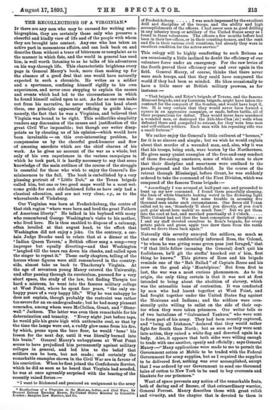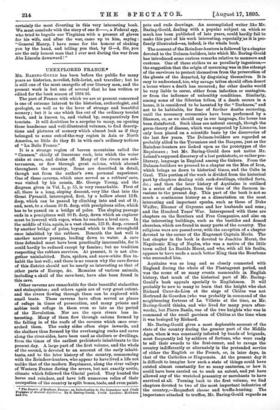THE RECOLLECTIONS OF A VIRGINIAN.*
IF there are any men who may be excused for writing auto- biographies, they are certainly those only who preserve a cheerful and kindly view of life and of the people with whom they are brought into contact. Any one who has taken an active part in momentous affairs, and can look back on and describe them without a trace of bitterness or complaint as to the manner in which fate, and the world in general has used him, is well worth listening to as he talks of his adventures on his way.through life. This characteristic brightens every page in General Maury's book, more than making up for the absence of a good deal that one would have naturally expected in such a chronicle. He writes as a soldier and a sportsman, confining himself rigidly to his own experiences, and never once stopping to explain the causes and events which had led to the circumstances in which he found himself called upon to act. As far as one can make out from his narrative, he never troubled his head about them, one principle apparently sufficing to guide him,— namely, the fact that he was a Virginian, and believed that Virginia was bound to be right. This soldierlike simplicity renders any discussion of the causes and justification of the great Civil War impossible; but though our writer disap- points us by cheating us of his opinion—which would have been invaluable — on this ever-interesting problem, he compensates us by the cheerful good-humour and flow of amusing anecdote which are the chief charms of his work. As he gives no account of the war as a whole, but only of his own experiences in the various campaigns in which he took part, it is hardly necessary to say that some knowledge of the main outlines of the course of the struggle is essential for those who wish to enjoy the General's Re- miniscences to the full. The book is embellished by a very pleasing portrait of " Little Dab," as the Texan brigade called him, but one or two good maps would be a most wel- come guide for such old-fashioned folks as have only had a -classical education, and are not very clear, e g., as to the whereabouts of Vicksburg.
Our Virginian was born at Fredericksburg, the centre of that rich region "where were born and bred the great Fathers of American liberty." He talked in his boyhood with many who remembered George Washington's visits to his mother, who lived here. He is thus enabled to dispose of a calumny, often levelled at that august head, to the effect that Washington did not enjoy a joke. On the contrary, a cer- tain Judge Brooke used to relate that at a dinner at the Indian Queen Tavern,' a British officer sang a song—very improper but equally diverting—and that Washington -" laughed till the tears ran down his cheeks, and called upon the singer to repeat it." These early chapters, telling of the heroes whose figures were still remembered in the country- side, almost take us back to Thackeray's Virginia. At the age of seventeen young Maury entered the University, and after passing through its curriculum, pursued for a very short space, the study of the law, but finding Thespis too hard a mistress, he went into the famous military college at West Point, where he spent four years, " the only un- happy years of a very happy life." Why he was unhappy he does not explain, though probably the restraint was rather too severe for an ex-undergraduate ; but he had many pleasant comrades, among whom were McClellan, Grant, and " Stone- wall " Jackson. The latter was even then remarkable for his determination and tenacity. "Every night just before taps, he would pile his grate high with anthracite coal, so that by the time the lamps were out, a ruddy glow came from his fire, by which, prone upon the bare floor, he would bone' his lesson for the next day, until it was literally burned into his brain." General Maury's unhappiness at West Point seems to have prejudiced him permanently against military colleges in general, and led him to the belief that soldiers can be born, but not made ; and certainly the remarkable examples shown in the Civil War are in favour of his conviction. When he first joined the Confederate Service, which he did as soon as he heard that Virginia had seceded, he was at once agreeably surprised with the bearing of the recently raised forces :—
" I went to Richmond and procured an assignment to the army • Recollection, of a Virginian in the Mexican, Indian, and Ciroit Wars. By 'General Dabney Bert:don Manry, En-United States Minister to Colombia. Landon : Sampson Low Manton, and Co. of Fredericksburg I was much impressed by the excellent drill and discipline of the troops, and the ability and high accomplishments of the officers. I had never seen as good drilling in any infantry troop or artillery of the United States army as I found in these volunteers. The officers a few months before had been in their law-offices, or in their counting-houses, and the rank and file in their various civil vocations, but already they were in excellent condition for the active service."
This eulogy will be highly comforting to such Britons as are occasionally a little inclined to doubt the efficiency of our
volunteer force under an emergency. For the raw levies of the South proved their efficiency over and over again in the field. General Maury, of course, thinks that there never
were such troops, and that they could have conquered the world if they bad been so minded. He likes occasionally to have a little sneer at British military prowess, as for instance :-
" That brigade, and Ector's brigade of Texans, and the famous Missouri brigade, and my Louisiana brigade, might have taken the contract for the conquest of the Soudan, and would have kept it, too. It is very certain that they would never have formed a square in an aggressive campaign, or made, before battle, all of their preparations for defeat. They would never have murdered a wounded man, or destroyed the Abb-bhu-Clea [sic] wells when defeated there and compelled to retreat, for they were true men and self-reliant soldiers. Each man with his repeating rifle was a small fortress."
We rather enjoy the General's little outburst of "bounce," for it is so sincere and simple ; but we wish he would explain about that murder of a wounded man, and, also, why it was that his troops, being such, were beaten by the Northerners. He gives many quaint examples of the free-and-easy conduct of these fire-eating amateurs, some of which seem to show that their discipline and smartness were confined to the parade-ground and the battle-field. In the course of the retreat through Mississippi, before Grant, he was suddenly ordered to take the command of the First Division, which was composed of the famous Texas brigade :—
" Accordingly I was aroused at half-past one, and proceeded to hunt up my new command. I found them peacefully sleeping, the lines of white blankets looking weird in the flickering light of the camp-fires. We had some trouble in arousing five thousand men under such circumstances. One fierce old Texan called out to me, `Somebody '11 shoot you directly, of you don't quit goin' about here makin' so much fuss !' But we got them
into the road at last, and marched punctually at 2 o'clock Their Colonel had not then the least conception of discipline ; so I and my staff devoted ourselves to Ross's brigade, for every potato patch and green apple tree drew them from the ranks until we drove them back again."
Naturally this severity annoyed the soldiers, so much so that one of them confidentially informed Ross, the Colonel, "to whom he was giving some green peas just foraged," that "if that little fellow (meaning the General) don't quit his foolishness, he'll git the stnffin' knocked out o' him, first thing he knows." This picture of Ross and his brigade reminds one of the "Bab Ballad" of Captain Reece and his crew on the good ship Mantelpiece.' But from first to last, the war was a most curious phenomenon. As to its origin, the only thing certain is that it was not at first intended to bring about the abolition of slavery, which was the ostensible bone of contention. It was conducted by men who had learnt together at West Point, and had fought together under the United States flag against the Mexicans and Indians ; and the soldiers were occa- sionally quite willing to enlist on the side of their cap- tor when they were taken prisoners. Oar writer tells us of two battalions of " Galvanised Yankees," who were sent to form part of his army. They had been recently captured, and "being all Irishmen," declared that they would rather fight for South than North ; but as soon as they were sent into action, they raised a white flag and deserted again in a body. Also, it appears that both sides were willing enough to trade with one another, openly and officially ; says General Maury :—" Many applications were made to me to permit the Government cotton at Mobile to be traded with the Federal Government for army supplies, but as I required the supplies to be delivered first, nothing was ever accomplished, except that I was ordered by our Government to send one thousand bales of cotton to New York to be used to buy overcoats and blankets for our prisoners."
Want of space prevents any notice of the remarkable feats, both of daring and of finesse, of that extraordinary warrior, General Forrest. Maury describes these with great relish and vivacity, and the chapter that is devoted to them is certainly the most diverting in this very interesting book. We must conclude with the story of one S—, a Federal spy, who tried to beguile our Virginian with a present of gloves for his wife, and after the war, came up to him, saying : "General Maury, I have come for the honour of shaking you by the hand, and telling you that, by G—d, Sir, you are the only honest man that I ever met during the war from Abe Lincoln downward ! "



































 Previous page
Previous page